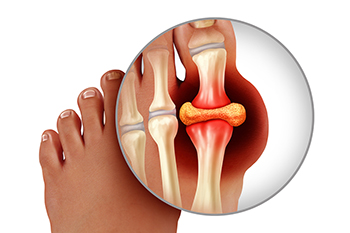1648 US Highway 130
North Brunswick, NJ 08902

Gout is a type of inflammatory arthritis characterized by sudden and severe pain, redness, and swelling in the joints, often affecting the big toe. Gout can cause excruciating pain and discomfort and may cause difficulty in walking. This condition arises from elevated levels of uric acid in the blood, which can form crystals in the joints and lead to intense inflammation. Diet plays a critical role in managing gout, and certain foods should be avoided to reduce the risk of flare-ups. High-purine foods, which can increase uric acid levels, include red meat, organ meats, and certain seafood such as sardines and anchovies. Sugary beverages and alcohol, particularly beer, can also worsen symptoms. Additionally, excessive consumption of processed foods can contribute to inflammation. By avoiding these dietary triggers and focusing on a balanced diet rich in fruits, vegetables, and whole grains, individuals can help manage gout more effectively and reduce the frequency of painful episodes. If you have episodes of gout, it is suggested that you are under the care of a podiatrist who can help you manage this condition.
Gout is a painful condition that can be treated. If you are seeking treatment, contact Dr. Robert Fink from Brunswick Foot & Ankle Group. Our doctor will treat your foot and ankle needs.
What Is Gout?
Gout is a form of arthritis that is characterized by sudden, severe attacks of pain, redness, and tenderness in the joints. The condition usually affects the joint at the base of the big toe. A gout attack can occur at any random time, such as the middle of the night while you are asleep.
Symptoms
Risk Factors
Prior to visiting your podiatrist to receive treatment for gout, there are a few things you should do beforehand. If you have gout you should write down your symptoms--including when they started and how often you experience them, important medical information you may have, and any questions you may have. Writing down these three things will help your podiatrist in assessing your specific situation so that he or she may provide the best route of treatment for you.
If you have any questions, please feel free to contact our office located in North Brunswick, NJ . We offer the newest diagnostic and treatment technologies for all your foot care needs.